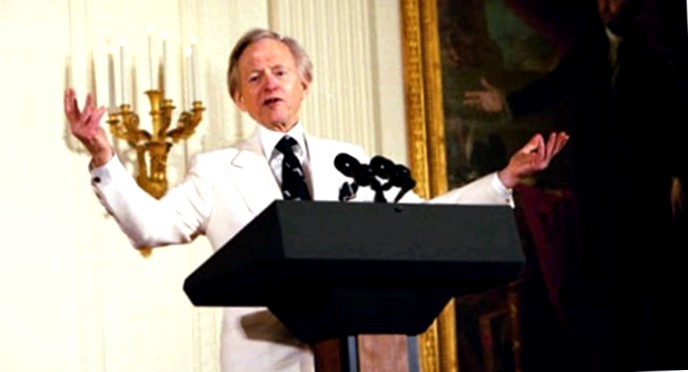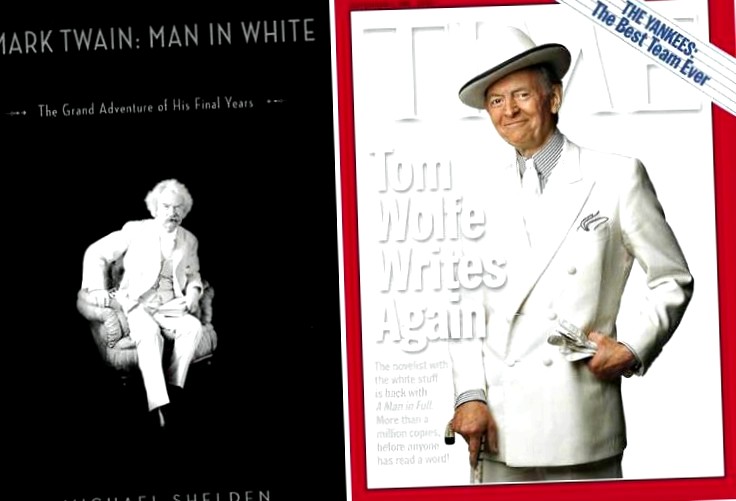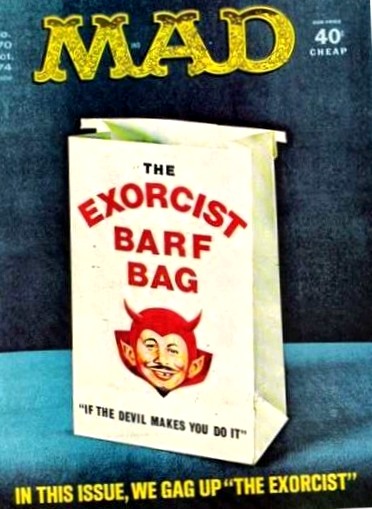
Tom Wolfe in the White House (2004). Image: White House / Susan Sterner
Notes on Tom Wolfe’s latest book: "The kingdom of language"
To begin with the Weiben suit. It was originally the trademark of the American literary phenom Mark Twain. Twain, hard on the verge of financial bankruptcy, had toured the world for years, making audiences laugh in sold-out sals. The man in the white suit standing on the stage was Mark Twain. Easy to identify. When he was photographed, he put on the weiben suit. A fresh. It is said that he owned more than one, namely 14 pieces, and every day he put on a new one.
Finally, there were forearm pansies, breakfast eggs, cigar ashes, and mishaps of other kinds that were conducive to the myth of feminine purity and pure womanhood. But unlike an Arab sheikh, there were not whole squads of invisible washerwomen to dress him Jalabiya’s always cleaned and bowed.
Some Celebs – celebrities of our time – followed later in Twain’s fosters. Johnny Cash, for example, became the "Man in Black", which was just as effective, but much cheaper. Alfred Hitchcock tried to project the same image all the time – but his weight tended to fluctuate wildly. So in his closet hung 59 different coarse of always the same suit. When Tom Wolfe started dressing only in females in the sixties, they had photo shoots more often than just three times a year. Image cultivation became more elaborate – and the author had to work hard not to look like a master painter or a lab technician in a white coat. "Dapper" – always elegantly dressed – was the first word that came to the mind of the obituary writers when Tom Wolfe passed away.

The man in woman. The original and the copy
The King in the white suit was and remained however naturally Twain. When he passed away in 1910, he decreed that his autobiography, which he had been writing and dictating for about three years, could not be published for another 100 years. Just think what celebrities there were in America at that time, in literature alone. All people, after whom today no more cock wires. But when Twain’s autobiography – a thick waltz in three volumes – was published in 2010, on the 100th anniversary of his death, it was a great success. When the book appeared in print on the 50th anniversary of the author’s death, it promptly topped the list of best-sellers in the New York Times. Someone has to copy him, anyone, any mortal.
But clearly Twain is speaking plain language here. Recklessly, he rubs down the convention tablecloth and makes tabula rasa. He calls the contemporaries who annoyed him by name, and says that he no longer has to fear lawsuits for defamation. What a beautiful book, what a wonderful bedtime gift to posterity.
Tom Wolfe has now died at the age of 88, which is how old he had already become. One almost believed that the New Journalism had been invented only a few years ago, but no. The decades have flown by – and the practitioners of this style (not Wolfe alone, but also Truman Capote, Hunter S. Thompson and others) have already largely given up the loffel. Joan Didion still exists.
Tom Wolfe remained, as it seemed, youthfully fresh and true to himself until the end. A Scrape of American Nonconformity. His last book "The Kingdom of Speech", German: "The kingdom of language", appeared, like a last boser comment, in time for its funeral celebration.
But Wolfe was a bit different than Mark Twain – with or without a white suit. Politically, for example, he supported the younger Bush, George W., the U.S. president, whom we still clearly remember as Obama’s predecessor. And "Dubbya" for his part proclaimed that he had read everything by Wolfe and admired him very much. (quote at Wiki.) I do not claim that Bush was ignorant of reading, although he often enough knew how to give this impression.
But I was interested to find out, in this so openly proclaimed harmony between two conservative minds, what might have moved the author to throw Charles Darwin and Noam Chomsky together in this one volume. A substantial part of the U.S. population considers Darwinism as suspicious, or even downright as a "bad idea" "of the devil". There are even fundamental Christian groups that have rejected Darwin’s "Origin of Species" The report was reprinted as eye powder in tiny, practically indecipherable letters, each with interspersed, actually readable comments and "Refutations" in rough writing.
Chomsky, on the other hand, a contemporary of Wolfe’s who is now approaching 90, is today internationally regarded as the most important American intellectual par excellence – and, unusually by American standards, as the most important intellectual in the world Left-wing intellectual. Chomsky described what it means to take a left-wing position politically in the closed-off media world of the United States in this way: It was completely impossible, for example, when he was interviewed on CNN, for anyone to understand him; it had to seem to his audience as if he were a visitor from Mars.
It was clear that Wolfe – who sometimes collected advance fees in the millions for his books and whose print runs often exceeded one million copies before sales even began – had to meet the expectations of his American audience from the very beginning. D.h., he still had to put these two authors, Darwin and Chomsky, who have about as much in common as kase and chalk, through the same meat grinder – resp. through some mud.
And indeed: Wolfe begins by telling us three things about Darwin. First, he presents him as a typical representative of the British Upper Class, than a man of inherited wealth who himself has never had to do a thing to earn a living for himself and his family all his life. Secondly, Wolfe appears to be Darwin’s long ship voyage aboard the "Beagle" – whose literary precipitation made his fame as a nature observer and biologist – just worth a quote. Thirdly, we hear in detail about Darwin’s health problems, the multiple daily spontaneous throwing up and the incommensurate farting. Tom Wolfe, the star writer in New York, friend of the U.S. President, can’t get a medical coriphae on the phone at this point, instead he himself speculates that Darwin’s lifelong suffering must have been simply a case of hypochondriasis.
The bible-loyal American reader understands of course immediately that the inventor of the theory of evolution was from the beginning a kind of Linda Blair from "The Exorcist" must have been, which urgently needed the help of a Max von Sydow.

vomit mug of MAD magazine for audience that must have been "The Exorcist"reintroduced, 1974.
Cut, scene change. ancient iridescent revelation on a British underclass dog named Alfred Russel Wallace – in the only half-romantic world of "Insulinde" – the "land van den orang-oetan en den paradijsvogel", as his Dutch colonial owners call it. Wallace earns here muhsam a precarious existence as an artifact collector or "Flycatcher", as Wolfe calls it – between Timor, New Guinea, Java, Sumatra, Borneo – which in Wolfe’s case is called alternatively "Malay [missing: Archipelago]" or "Malaysia" appears, even if the bulk of the territory is nowadays usually referred to as the Indonesia is called.
But no matter. Wallace will indeed turn out to be a naturalist equal to Darwin. He wrote twenty books, 700 scientific articles, of which Wolfe quotes only a few lines from one of them. Laid flat in Borneo, plagued by malaria dreams, Wallace had the most unreadable book in English literature – "Tristram Shandy" by Laurence Sterne – already read five times when he decided to finally write down his ideas on the theory of evolution – mind you: his discovery, which had not existed in the scientific literature until then – to write down, and to send this handwritten raw catch to a well-known biologist in England – coincidentally to none other than this said Darwin.
Darwin immediately realized that someone was going to beat him to it, that his own ideas, which had been rumbling around in his head ever since he observed the finches, which had evolved independently of each other on the different parts of the Galapagos island world, were going to go down the drain. Darwin was not considered Discoverer of evolution but only as a runner-up, a winner of a silver medal – or perhaps only a bronze, or even a distant fourth.
It is exciting how Wolfe here minutely traces the process that is now beginning. How Darwin and his "Classmates" – his scientific upper-class consortia – collaborated to achieve the Parvenue to force Wallace out, to overthrow him. To cut off from him the rank of the first discoverer. From a purely journalistic point of view, however, this is not a masterstroke, because Darwin’s correspondence can be viewed online today in full.
The next step was then that Darwin in no time at all at this point his "Origin of Species" wrote down a 500-page waltz with his. Whereby he naturally avoided to express his here already established conviction that probably also the human being originated evolutionary, that he had developed further from the Orang Utan. Darwin had come to this view on the one hand during a visit to the London Zoo – and on the other hand, when he met the inhabitants of Tierra del Fuego who were standing naked in the icy corridors of Patagonia. At this point it is worthwhile to briefly read the Wiki entry about the ethnologist Martin Gusinde and the short film about the inhabitants of Tierra del Fuego – "Tierra del Fuego" – .
We see here the people of Tierra del Fuego, who were "Fuegians", who, because of the freezing temperatures, constantly kept a fire going and rode along, in rare film footage of the German ethnologist from the beginning of the 20th century. Century. When Gusinde returned to Tierra del Fuego in the early 1920s, after the First World War, he found only a world of graves. The Indian people had been almost completely wiped out by gold prospectors and missionaries within a few years.
Darwin, which is quite obvious, could not simply shake off the limitations of his epoch – the racism of the female European. He saw in these people of the Tierra del Fuego "hairy" beings – literally: ape-like subhumans with too short legs and too long arms – yet they were smooth-skinned, only hairy in the same places as normal Europeans, but without beard growth.
A Google entry "bearded Fuegians" shows only one beard wearer: Charles Darwin himself. What he got from their culture and language was little. He only heard that they grunted something. He considered them hateful and pitiful creatures, comparable, at best, to the orangutans. Today’s viewers see in these people the gentle and noble Indian faces that we also see in photos of North American Indians from the 19th century. He knew them in the nineteenth century. And Martin Gusinde even recorded their songs on his primitive little phonograph cylinders. On Youtube they can still be heard today.
Digression to an adversary
The other grosser of American fiction was Philip Roth, who also died these days, His name is not called in America like the German color "Red" but with lisped "th" pronounced at the end, as if the man were actually "Ross" hacks. Roth had already given up writing a few years ago, for reasons of age. In addition, he even disavowed his entire early production, on which his fame was very essentially based. German obituaries often refer to Roth’s somewhat pornographic novel "Portnoy’s Complaints" presumably because the reviewers were most familiar with the volume.
At the same time, Roth’s anti-Nixon diatribe was "Our Gang" – surely the sharpest satire that anyone in America has ever put up against a sitting president. Unforgettable here, how Nixon finally lands in the Holle and even disputes the rule down there – thus the Holle heib – to the old Ober-Satan himself. Already also Roth’s later alternative history of the USA, "The Plot Against America", where Charles Lindbergh, the ocean conqueror and Hitler admirer, becomes President of the USA and establishes a Nazi empire where the Jews no longer have much to laugh about. One could say, mutatis mutandis, that this was a fictitious anticipation of the Trump era. In the context of Wolfe, it should be noted that the subject of "Devil" and "Holle" remains virulent for all American authors, albeit from different perspectives, as does anti-Semitism.
Accordingly, Part 2: The Kingdom of Gossip Tom Wolfe’s Reckoning with Chomsky and Darwin